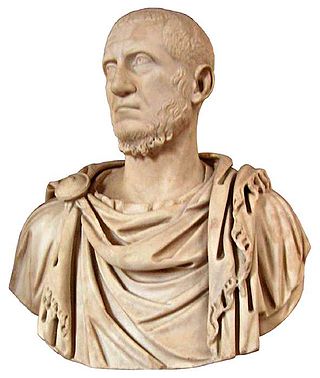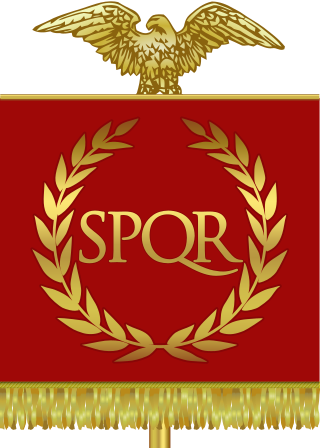Related Research Articles

Marcus Claudius Tacitus was Roman emperor from 275 to 276. During his short reign he campaigned against the Goths and the Heruli, for which he received the title Gothicus Maximus.

The Tetrarchy was the system instituted by Roman emperor Diocletian in 293 AD to govern the ancient Roman Empire by dividing it between two emperors, the augusti, and their junior colleagues and designated successors, the caesares.

Aurelian was a Roman emperor, who reigned during the Crisis of the Third Century, from 270 to 275. As emperor, he won an unprecedented series of military victories which reunited the Roman Empire after it had nearly disintegrated under the pressure of barbarian invasions and internal revolts. Born in modest circumstances, most likely in Moesia Superior, he entered the Roman army in 235 and climbed up the ranks. He went on to lead the cavalry of the emperor Gallienus, until Gallienus' assassination in 268. Following that, Claudius Gothicus became emperor until his own death in 270. Claudius' brother Quintillus ruled the empire for three months, before Aurelian became emperor.

The Crisis of the Third Century, also known as the Military Anarchy or the Imperial Crisis (235–284), was a period in which the Roman Empire nearly collapsed. The crisis ended due to the military victories of Aurelian and with the accession of Diocletian and his implementation of reforms in 284.

The Roman emperor was the ruler and monarchical head of state of the Roman Empire, starting with the granting of the title augustus to Octavian in 27 BC. The term "emperor" is a modern convention, and did not exist as such during the Empire. Often when a given Roman is described as becoming emperor in English, it reflects his taking of the title augustus and later basileus. Another title used was imperator, originally a military honorific, and caesar, originally a surname. Early emperors also used the title princeps alongside other Republican titles, notably consul and pontifex maximus.
Sir is a formal honorific address in English for men, derived from Sire in the High Middle Ages. Both are derived from the old French "Sieur" (Lord), brought to England by the French-speaking Normans, and which now exist in French only as part of "Monsieur", with the equivalent "My Lord" in English. Traditionally, as governed by law and custom, Sir is used for men who are knights and belong to certain orders of chivalry, as well as later applied to baronets and other offices. As the female equivalent for knighthood is damehood, the suo jure female equivalent term is typically Dame. The wife of a knight or baronet tends to be addressed as Lady, although a few exceptions and interchanges of these uses exist.
Princeps is a Latin word meaning "first in time or order; the first, foremost, chief, the most eminent, distinguished, or noble; the first person". As a title, princeps originated in the Roman Republic wherein the leading member of the Senate was designated princeps senatus. It is primarily associated with the Roman emperors as an unofficial title first adopted by Augustus in 23 BC. Its use in this context continued until the regime of Diocletian at the end of the third century. He preferred the title of dominus, meaning "lord" or "master". As a result, the Roman Empire from Augustus to Diocletian is termed the "principate" (principatus). Other historians define the reign of Augustus to Severus Alexander as the Principate, and the period afterwards as the "Autocracy".

The title of imperator originally meant the rough equivalent of commander under the Roman Republic. Later, it became a part of the titulature of the Roman Emperors as their praenomen. The Roman emperors themselves generally based their authority on multiple titles and positions, rather than preferring any single title. Nevertheless, imperator was used relatively consistently as an element of a Roman ruler's title throughout the Principate and the Dominate. The word itself derives from the stem of the verb imperare, meaning 'to order, to command'. The English word emperor derives from imperator via Old French: Empereür.
The term Don abbreviated as D., is an honorific prefix primarily used in Spain and Hispanic America, and with different connotations also in Italy, Portugal and its former colonies, and formerly in the Philippines.
An honorific is a title that conveys esteem, courtesy, or respect for position or rank when used in addressing or referring to a person. Sometimes, the term "honorific" is used in a more specific sense to refer to an honorary academic title. It is also often conflated with systems of honorific speech in linguistics, which are grammatical or morphological ways of encoding the relative social status of speakers. Honorifics can be used as prefixes or suffixes depending on the appropriate occasion and presentation in accordance with style and customs.

In the English language, an honorific is a form of address conveying esteem, courtesy or respect. These can be titles prefixing a person's name, e.g.: Mr, Mrs, Miss, Ms, Sir, Dame, Dr, Cllr, Lady, or Lord, or other titles or positions that can appear as a form of address without the person's name, as in Mr President, General, Captain, Father, Doctor, or Earl.

The Principate is the form of imperial government of the Roman Empire from the beginning of the reign of Augustus in 27 BC to the end of the Crisis of the Third Century in AD 284, after which it evolved into the Dominate.

The Dominate, also known as the late Roman Empire, is the despotic form of imperial government of the late Roman Empire. It followed the earlier period known as the Principate. Until the empire was reunited in 313, this phase is more often called the Tetrarchy.

A barracks emperor was a Roman emperor who seized power by virtue of his command of the army. Barracks emperors were especially common from 235 to 284 AD, during the Crisis of the Third Century, which began with the assassination of Severus Alexander. Beginning with Maximinus Thrax, there were approximately fourteen barracks emperors in 33 years, which produced an average reign of a little over two years apiece. The resulting instability in the imperial office and the nearly-constant state of civil war and insurrection threatened to destroy the Roman Empire from within and left it vulnerable to attack from external adversaries.

Dame is an honorific title and the feminine form of address for the honour of damehood in many Christian chivalric orders, as well as the British honours system and those of several other Commonwealth realms, such as Australia and New Zealand, with the masculine form of address being Sir. It is the female equivalent of a knighthood, which is traditionally granted to males. Dame is also a style used by baronetesses in their own right.
As with most other military forces the Roman military adopted an extensive list of decorations for military gallantry and likewise a range of punishments for military transgressions.

In modern scholarship, the "late" period of the Roman army begins with the accession of the Emperor Diocletian in AD 284, and ends in 480 with the death of Julius Nepos, being roughly coterminous with the Dominate. During the period 395–476, the army of the Roman Empire's western half progressively disintegrated, while its counterpart in the East, known as the East Roman army remained largely intact in size and structure until the reign of Justinian I.

The constitution of the late Roman Empire was an unwritten set of guidelines and principles passed down, mainly through precedent, which defined the manner in which the late Roman Empire was governed. As a matter of historical convention, the late Roman Empire emerged from the Roman Principate, with the accession of Diocletian in AD 284, his reign marking the beginning of the Tetrarchy. The constitution of the Dominate outrightly recognized monarchy as the true source of power, and thus ended the facade of dyarchy, in which emperor and Senate governed the empire together.

The History of the Constitution of the Late Roman Empire is a study of the ancient Roman Empire that traces the progression of Roman political development from the abolition of the Roman Principate around the year 200 until the fall of the Western Roman Empire in 476 CE. When Diocletian became Roman Emperor in 284 CE, he inherited a constitution that was no longer functioning, and so he enacted the most significant constitutional reforms in over 300 years. His reforms, much like those 300 years before, were intended to correct the errors in the previous constitution. Diocletian's specific reforms were less radical than was the reality that he exposed the state of government for what it had been for centuries: monarchy. With Diocletian's reforms the Principate was abolished, and a new system, the Dominate, was established.

Augustus was an ancient Roman title given as both name and title to Gaius Julius Caesar Octavianus, Rome's first Emperor. On his death, it became an official title of his successor, and was so used by Roman emperors thereafter. The feminine form Augusta was used for Roman empresses and other female members of the imperial family. The masculine and feminine forms originated in the time of the Roman Republic, in connection with things considered divine or sacred in traditional Roman religion. Their use as titles for major and minor Roman deities of the Empire associated the Imperial system and imperial family with traditional Roman virtues and the divine will, and may be considered a feature of the Roman imperial cult.
References
- 1 2 De Vaan, Michiel (2008). "domus, dominus". Etymological Dictionary of Latin and the other Italic Languages. Leiden Indo-European Etymological Dictionary Series. Vol. 7. Leiden, Boston: Brill. p. 177–179. ISBN 9789004167971.
- 1 2 One or more of the preceding sentences incorporates text from a publication now in the public domain : Chisholm, Hugh, ed. (1911). "Dominus". Encyclopædia Britannica . Vol. 8 (11th ed.). Cambridge University Press. p. 405.
- 1 2 Chisholm, Hugh, ed. (1911). . Encyclopædia Britannica . Vol. 8 (11th ed.). Cambridge University Press. p. 405.
- ↑ Niculescu, Alexandru. Despre numele lui Dumnezeu în limba română.
- ↑ "jaundone". Hiztegia - EHHE (in Basque). Retrieved 3 May 2023.
- ↑ "done". OEH - Bilaketa - OEH (in Spanish). Retrieved 3 May 2023.
- ↑ Cambridge Ancient History, Vol. XI, The High Empire (2008) p. 82
- ↑ Shorter, D., Rome and her Empire (2014) p. 174
- ↑ Cambridge Ancient History, Vol. XI, The High Empire (2008) p. 81
- ↑ Watson, A., Aurelian and the Third Century (2004) p. 188
- ↑ Menne, I., Power and Status in the Roman Empire, AD 193–284 (2011) p. 21
- ↑ "Madame - Dictionnaire de l'Académie française, 9e édition". Dictionnaire de l’Académie Française. Retrieved 2 December 2021.
- ↑ "Definition of Madam". Dictionary by Merriam-Webster. Retrieved 2 December 2021.
- ↑ "Definition of Ma'am". Dictionary by Merriam-Webster. Retrieved 2 December 2021.
- ↑ "Definition of Dame". Dictionary by Merriam-Webster. Retrieved 2 December 2021.
- ↑ "How to get a Knighthood or Damehood". Awards Intelligence. 2016. Archived from the original on 25 October 2018. Retrieved 25 October 2018.
A knighthood, and the female equivalent, a damehood, is an award given by The Queen to an individual for a major, long-term, contribution in any activity, usually at a national or international level.
- ↑ "Dominus/a". Cambridge University Library — Glossary of Cambridge-related terminology. 29 April 2020. Retrieved 2 December 2021.
- ↑ "Oxford Glossary". University of Oxford. Retrieved 2 December 2021.
- ↑ "Don". Cambridge University Library — Glossary of Cambridge-related terminology. 29 April 2020.